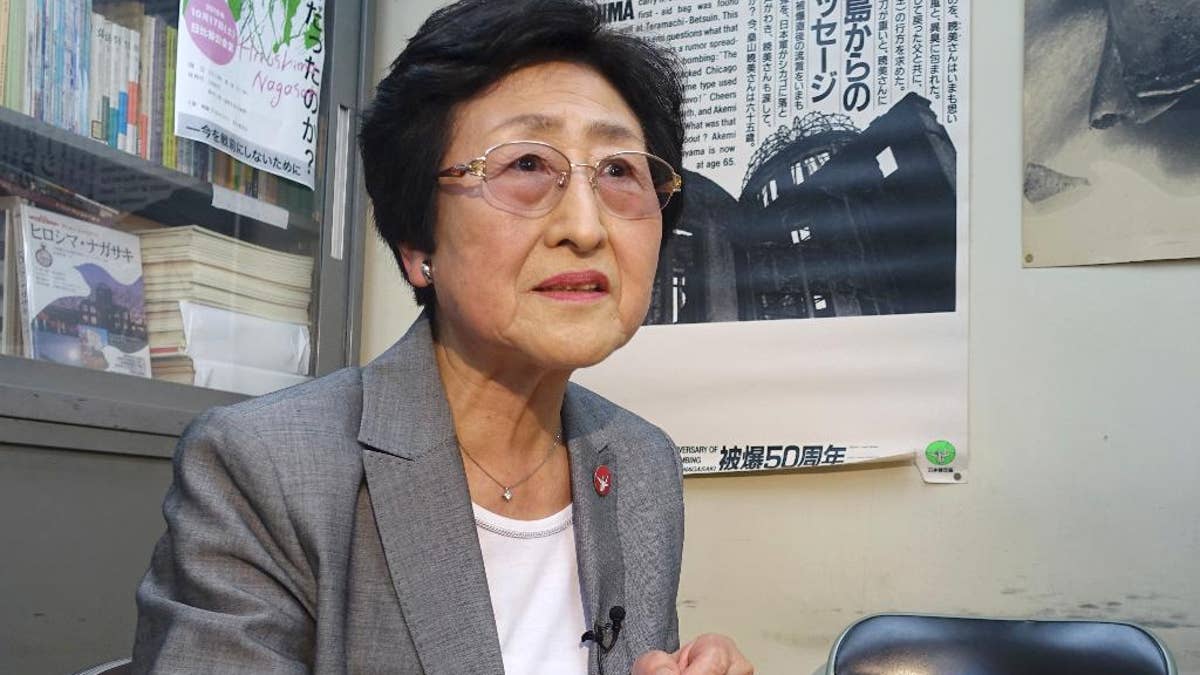
In this Thursday, May 12, 2016 photo, Michiko Kodama, 78, a survivor of the Hiroshima atomic bombing, speaks during an interview at an office of a survivors' organization in Tokyo. A flash in the sky over Hiroshima, Japan, in 1945 caused a lifetime of ordeal for an elementary school student Michiko Kodama. For her World War II will not be over until a nuclear-free world is achieved and President Barack Obama’s visit to Hiroshima on Friday is “just a step in the process.” (AP Photo/Mari Yamaguchi) (The Associated Press)
TOKYO – A flash in the sky over Hiroshima, Japan, caused a lifetime of ordeal for an elementary school student.
Her external wounds have healed from the atomic bomb dropped by the U.S. on Aug. 6, 1945, and she has overcome discrimination in employment and marriage.
But Michiko Kodama is still troubled by the possibility that the radiation she was exposed to affected her children. The death of her younger daughter, Akiko, to cancer at age 45 devastated her more than any of her own hardships.
"It's been five years and I still can't get over the pain," Kodama, 78, said in an interview in Tokyo. She has decorated her home with portraits of Akiko, and says goodbye to them when she goes out. She wears a ring found in her daughter's belongings and rubs it gently from time to time.
For her, World War II will not be over until a nuclear-free world is achieved, she said. U.S. President Barack Obama's visit to Hiroshima on Friday is "just a step in the process."
She said she hopes his visit will re-energize his push to rid the world of nuclear weapons, and he will use his remaining power "to convince the world that we need to abolish them. ... That is what I hope to see."
Kodama and her husband discussed at length whether to have children. She was cautious because of the discrimination she had faced. She was turned down for jobs after being asked if she was an atomic-bomb survivor, and the family of her first love said a "radiated person's blood" was not welcome in the family.
"As second-generation 'hibakusha,' our children would face difficulty," she said, using the Japanese term for those who were exposed to radiation. "But we decided that we must treasure new life, and so I gave birth to both of them, and they grew up to be good daughters."
Akiko died in February, 2011, three months after her cancer was detected.
"The hereditary impact of radiation exposure is not scientifically proven, but my DNA, as a radiated person, has been damaged, and that's a fact of science. I'm afraid my damaged DNA has caused my daughter's death," she said, tears trickling down her cheek.
"Our pain is not just that moment in history," she said. She worries her two grandsons may face the same questions about her background when they get married.
"For most ordinary people, a child born or getting married is a blissful moment in life," she said. "But not for us. Atomic bombing survivors are saddened, or worry. That's unchanged even 70 years later."
___
Follow Mari Yamaguchi on Twitter at twitter.com/mariyamaguchi
Her work can be found at http://bigstory.ap.org/content/mari-yamaguchi
